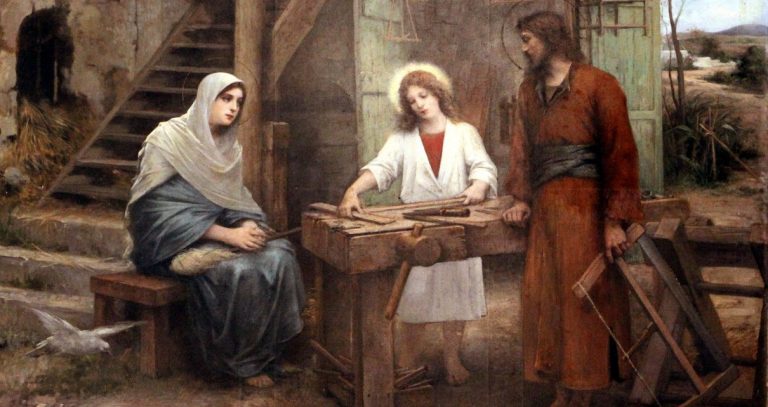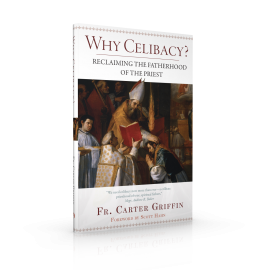By Fr. Carter Griffin
Fr. Carter Griffin is a priest of the Archdiocese of Washington. Since 2011 he has been engaged in the formation of seminarians at Saint John Paul II Seminary in Washington, DC. Fr. Griffin is a graduate of Princeton University and a former line officer in the United States Navy. He is the author of Why Celibacy?: Reclaiming the Fatherhood of the Priest.

St. Joseph probably spent more time with Jesus than any other human being in history. That is quite a thought.
Think of all those hours they labored together in the workshop, honing their craft, much of the time in silence. Joseph must have paused often just to gaze with wonder at his son, conceived by the Holy Spirit in the womb of his beloved bride.
Joseph and Jesus would have chatted about things trivial and things profound. They worked hard, interacted with clients, and discussed the current events of the day. They probably laughed a lot too, maybe even enjoyed some playful banter. Jesus picked up Joseph’s accent, his mannerisms, his sense of humor. Joseph’s love for Jesus overflowed into a life of intense prayer. Jesus, in turn, loved Joseph as only a perfect son could. They must have looked at each other with overwhelming sentiments of joy and affection.
St. Joseph, the quintessential “just man” of Scripture, is a model for all Christians. He was a man of deep faith, a man who trusted God with all his heart, a man of profound humility. He did not draw attention to himself and spoke few words. He shows us that a flourishing life is not one of self-promotion but one of simple and quiet generosity.
He is a model for all Christians, but even more is he a model for all priests. This may come as a surprise; after all, Joseph was not himself a priest. He was from the tribe of Judah, not a Levite. How can he be a special model for priests?
First, because God entrusted the care of His Son to Joseph. To every priest, God also entrusts the care of His Son. How seriously must Joseph have taken this charge! How intensely must he have adored Jesus, even in the womb of Mary, and committed himself to His protection!
The nineteenth century French priest St. Peter Julian Eymard once wrote, “If the father of Origen used to kiss his child during the night and adore the Holy Spirit living within Him, can we doubt that Joseph must often have adored Jesus hidden in the pure tabernacle of Mary? How fervent that adoration must have been: My Lord and my God, behold your servant! No one can describe the adoration of this noble soul.”
Priests, entrusted with the adoration and the protection of the Son of God, especially in the Most Blessed Sacrament, are called above all to be men of ceaseless and intense adoration. St. Therese called prayer “a simple glance darted upwards to Heaven.” A priest during his ministry can direct his prayer upwards in a “simple glance” and St. Joseph will show us the way to love Jesus better.
Second, Joseph was a man of humble authority. Just think—as head of the Holy Family he had temporal authority over Jesus and Mary! Joseph was responsible for the welfare of two beings whose holiness far outstripped his. And yet, his was a real authority. He was the only man honored with the title “Abba” by the Son of God. Joseph trusted God to make up for his weaknesses, to help him serve Jesus and Mary with wisdom, humility, and fidelity. How often do we priests perceive the holiness of the people we serve, holiness that sometimes far outstrips our own, and yet we are called to serve them with a genuine, humble authority. Joseph, again, can show us the way.
Third, like Joseph, priests have a unique relationship to Our Lady. Levitical priests ministered before the Ark of the Lord in Jerusalem. While Joseph was not a Levitical priest, he did minister to Mary, the Ark of the New Covenant, who bore Jesus in her immaculate womb. As the priest St. John would do later, Joseph took Mary into his home, into his heart, and gave her everything he had. Is this not a beautiful image of the priest today, ministering before the Tabernacle of the Lord in our churches?
Joseph was called to protect the Father’s two greatest treasures on earth, His Divine Son and His beloved daughter Mary. There is no greater privilege given to any man on earth, and these duties fall first to the priest. Once again, Joseph can show us the way.
Finally, St. Joseph is a model for celibate priests in the way he exercised his virginal fatherhood over Jesus. Joseph was commissioned by God to care for Jesus, to provide for Him, to teach Him, to love Him, to protect Him. Can there be a better model for the celibate priest?
Priests are called to supernatural fatherhood, to give life in the order of grace. They do so by nourishing their people from the sources of grace, especially the very Bread of Life, by proclaiming and preaching the Word of God, and by protecting the deposit of faith from every error and confusion.
“Go to Joseph,” the Pharaoh told his people who were starving for bodily food. Today countless souls are starving, not for bodily food, but for the food that nourishes our immortal souls. It is priests who are called above all to nourish our people from the plentiful storehouses of God’s grace.
“Go to Joseph,” we hear again, and he will show us the way.
You Might Also Like

Priestly celibacy, some say, is an outdated relic from another age. Others see it as a lonely way of life.
But as Fr. Carter Griffin argues in Why Celibacy?: Reclaiming the Fatherhood of the Priest, the ancient practice of celibacy, when lived well, helps a priest exercise his spiritual fatherhood joyfully and fruitfully.